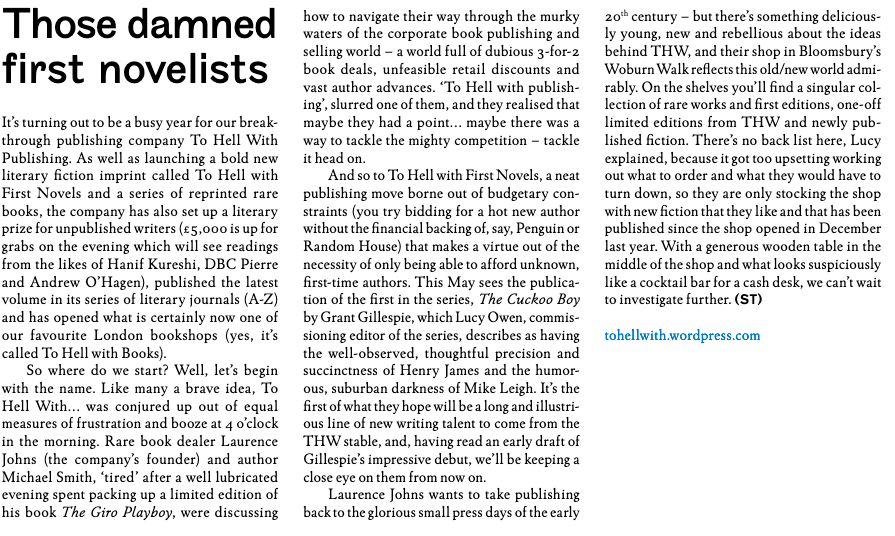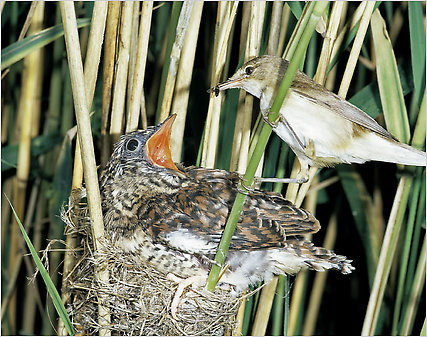The book club that says To Hell with publishing
by Ben Machell October 23 2010
Lucy Owens, Laurence Johns and Dean Ricketts are an outift with fingers in many literary pies

Ben Machell October 23 2010 12:01AM
Monthly event set up by an independent publisher encourages the submission of manuscripts and it runs a competition.
Once a month at Peter Parker’s Rock’n’Roll Club — a cosy bar underneath one of the many guitar shops on Denmark Street, in Central London — you will find To Hell with the Lighthouse, a popular literary night. To begin with, it’s not an obviously bookish do: a surplus of sticky, silly-looking happy-hour cocktails, a lot of soul music and a young, giddy crowd doesn’t scream “salon”. But over the next couple of hours a quartet of aspiring novelists take to the tiny stage, read from their books and receive warm applause before — they hope — selling a few copies, earning a few drinks or winning themselves a few more thumbs-aloft “likes” on Facebook.
So far, so groovy book night, the kind that has proliferated remarkably over the past 18 months or so. What sets it apart, though, is that the monthly event was set up by an independent publisher. To Hell with Publishing, founded in 2007, is one of the few UK publishers that encourages the submission of unsolicited manuscripts and it now runs a competition, To Hell with Prizes, conceived to uncover the best unpublished novel in the UK, plus a dedicated imprint for first novels, To Hell with First Novels (this year’s inaugural winner was Grant Gillespie’s The Cuckoo Boy).
Finally, as well as its literary night, its publishing label and competition, it also puts out a regular journal, under the (possibly now guessable) banner To Hell with Journals.
For one small outfit to have this many fingers in this many literary pies might seem unusual and, given the uncertain state of UK book publishing, rather reckless. But it is the very state of publishing that prompted Lucy Owen, Laurence Johns, a rare-books dealer, and Dean Ricketts, one of his customers and the owner of a marketing agency, to act in the first place.
“When we decided to start something, it was at that point when everything was being sold three-for-two, everyone was discounting heavily and celebrity culture had taken full hold of the book market,” Ricketts says. “You could feel that something was wrong … in the quality of the new releases, in the amount of new releases … It was clear that fewer risks were being taken in investing in new writers.
“We would talk about how interesting genres and subcultures were always led by small publishing houses and bookshops, but how these had been slowly eroded,” Johns says. “The distinctive voices — where were they going to come from in a generation’s time, when there is no room for independent publishing?”
“Independent” should not be confused with “marginal”, though. Big literary names haven’t been shy in associating themselves with the To Hell with … project: earlier this year David Vann gave a reading at one of its events, also attended by Florence and the Machine’s Florence Welch. Adam Thirlwell, DBC Pierre and Hanif Kureishi have appeared at the To Hell with the Lighthouse night. Their journals have included contributions from Simon Armitage, Richard Milward and Hisham Matar, the first issue put together by the Faber editor Lee Brackstone. Big publishers are paying attention, an unavoidable fact when you consider that the winner of their To Hell with Prizes competition — Bed, by David Whitehouse — was picked up for publishing by Canongate. “There’s been a massive amount of goodwill from the rest of the industry, which I was surprised by,” Johns says. “All the big publishing houses and agencies have said, what can we do to help?”.
Drawing some of their inspiration from existing independent, multifaceted publishers, such as Dave Eggers’ McSweeney’s or City Lights in San Francisco, To Hell with Publishing put out its first book, Shorty Loves Wing Wong, in 2006 — a collaboration between the writer Michael Smith and the artist Jim Medway featuring anthropomorphic cats in Hartlepool. “For us, it’s about understanding the writer and knowing what they are trying to do,” Ricketts says. At a lot of publishers you’ll find books being turned down because ‘the climate’s not right for that’, but no one asking whether it’s actually any good.”
“The publishers are going the way of major record labels and playing a numbers game,” Johns says. “What they do is think, right, we’ll get ten writers, give them each a five-grand advance that they can barely live off, and then hopefully one of them will sell enough to cover the cost of the rest of them.”
In contrast, independent publishers and bookshops should be nurturers of talent. “Places like City Lights and Shakespeare and Company in Paris weren’t just about selling books or even selecting good books. Authors went there when they were broke, or needed somewhere to stay, or to get feedback on their work,” says Johns, who runs his own independent bookshop, Amuti23. Has he ever put writers up in the shop?
“Erm, I’ve ended up with people in there overnight,” he grins. “Not always intentionally though.” Johns is leaving his premises at the end of the month and taking the shop online — not, he claims, because the business is struggling, but so that he can devote more time to To Hell with Publishing. “We would like to open a To Hell with bar at some stage, though,” he says.
What he and Ricketts and Owen all maintain is that, despite To Hell with Publishing’s reactionary-sounding name, it is not doing anything particularly groundbreaking. “In a bizarre way, we’re more of a return to traditional publishing. We do all the things a publisher is supposed to, and which were traditionally done: readings, galvanising the audience, searching for new talent,” Johns says. “To Hell with Publishing isn’t supposed to sound negative … we see it as more of a battle cry, or a toast.”
It is not the only publisher doing something new by being old-fashioned. In a small second-floor studio unit in Dalston, East London, Ditto Press Ltd not only publishes its own books, but prints them too. Using a simple stencil-printing process, Bess Freeman and Bruno Bayley, in their mid-twenties, have produced limited but successful runs of art books for the past two years. From January they are set to start publishing and printing novels too.
“The first one we will be doing is the seventh novel by a writer called Duncan Fallowell,” Bayley says. “He was The Spectator’s rock critic at 21, he was going to be the lead singer of Can, and his work appeals to anyone who has an interest in travel or music or sex or drugs. It could quite easily have been put out by a bigger publisher, but he wanted to deal with us.”
Freeman and Bayley explain that though major publishers are letting readers down through lack of choice and variety from above, the fact that “everyone who has ever written something can now make a made-to-order laser-printed book of their own work” means we are also swamped from below. “We are over-saturated with stuff we don’t want to read,” Freeman says, which is where the role of new indy publishers and bookshops as both filters and tastemakers come in. Just like the music industry, Freeman says: “When I was younger I was really into underground music … the rave scene, punk and hardcore. I’d go over to record shops with a crate of records and meet all these people and talk about what was new. I’m doing exactly the same thing now with our books.”
On the other side of London from Dalston, on the slightly more scrubbed-up Kensington Park Road, this approach still holds true. “Selling books has always been about matching readers to titles,” says Felicity Rubinstein, the co-owner of the independent bookshop Lutyens & Rubinstein, which has been open for business for a little more than a year. What sets Rubinstein and her business partner, Sarah Lutyens, apart is that they double as working literary agents and, like Ditto and To Hell With, are also operating in another part of the book-selling process as a reaction against the limitations of big publishers.
“There’s huge frustration about the way books are sold in this country,” she explains. “Our jobs as agents is to hand-sell individual projects with individual editors. But after we’ve placed them with a publisher, we have very little control over how it gets to the readers. To be able to come round the other side and actually put books in people’s hands is fantastically satisfying.”
Similarly demonstrating this kind of flexibility and fluidity is the London Word Festival — founded in 2007 as a young, fun, spiky alternative to traditional literary festivals — which has just commissioned a limited-edition book, Shad Thames, Broken Wharfby Chris McCabe. And there are signs that major publishers understand that there is value in keeping abreast of how people are responding to an uncertain books industry in which new, small thoughtful movers can operate on their own terms. Craig Taylor is the editor of the downloadable literary magazine Five Dials, which covers topics ranging from Sartre’s letters to the 1980s rap group NWA, and is supported by Hamish Hamilton and thus under the auspices of Penguin.
“I don’t think Penguin even knows what it has on its hands with Five Dials … but it serves them well, because people get excited about it,” Taylor says. “We have launch parties in great locations, with people like Jonathan Safran Foer and Grayson Perry involved. And if a young writer doesn’t necessarily have a novel or a full-length non-fiction book, we can still publish one of their essays or stories. We’re doing what magazines have always done — cultivating talent.”
And like To Hell With and Ditto , Taylor thinks that Five Dials may one day start to publish its own books. “We could definitely spin it out that way. If you take the opportunity that this time of upheaval affords, then when the dust settles you can be in a good position,” he says. “Publishing is in such a weird state. Right now we can be anything.”







 Animal Farm by George Orwell
Animal Farm by George Orwell


























